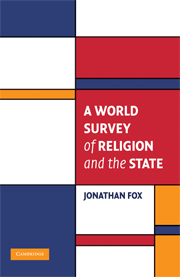Book contents
- Frontmatter
- Contents
- Acknowledgments
- 1 Introduction
- 2 The Question of Religion's Role in Politics and Society Modernization, Secularization, and Beyond?
- 3 Quantifying Religion
- 4 Global GIR from 1990 to 2002
- 5 Western Democracies
- 6 The Former Soviet Bloc
- 7 Asia
- 8 The Middle East and North Africa
- 9 Sub-Saharan Africa
- 10 Latin America
- 11 Patterns and Trends
- 12 Conclusions
- Appendix: Data Collection and Reliability
- Bibliography
- Index
1 - Introduction
Published online by Cambridge University Press: 05 June 2012
- Frontmatter
- Contents
- Acknowledgments
- 1 Introduction
- 2 The Question of Religion's Role in Politics and Society Modernization, Secularization, and Beyond?
- 3 Quantifying Religion
- 4 Global GIR from 1990 to 2002
- 5 Western Democracies
- 6 The Former Soviet Bloc
- 7 Asia
- 8 The Middle East and North Africa
- 9 Sub-Saharan Africa
- 10 Latin America
- 11 Patterns and Trends
- 12 Conclusions
- Appendix: Data Collection and Reliability
- Bibliography
- Index
Summary
This study asks a seemingly simple set of questions. What is the extent of government involvement in religion (GIR) between 1990 and 2002 across the globe? Has the extent or nature of this involvement changed during this period? What social and political factors can explain the variation over place and time in GIR? How is GIR otherwise related to important social and political phenomena?
The answers to these questions are not so simple. The intersection between religion, state, and society is complex and not fully understood. This is reflected in the current state of the scholarship on the topic. The first element of the basic problem in this field of scholarship can be illustrated by the legend of the Oracle at Delphi, who was once asked who was the smartest person in the world. The answer she gave was Socrates. When he heard about this, Socrates was at first confused because he felt that he knew nothing. Upon reflection, Socrates reasoned that the Oracle had declared him the smartest person in the world because although he knew nothing, at least he knew that he knew nothing. The rest of the people in the world believed that they knew something but their supposed knowledge was incorrect or inaccurate. Thus, while Socrates' knowledge could be said to be zero, everyone else's knowledge was less than nothing.
I am not suggesting that the current scholarship on the intersection between religion, politics, and society is worth less than nothing.
- Type
- Chapter
- Information
- A World Survey of Religion and the State , pp. 1 - 11Publisher: Cambridge University PressPrint publication year: 2008

